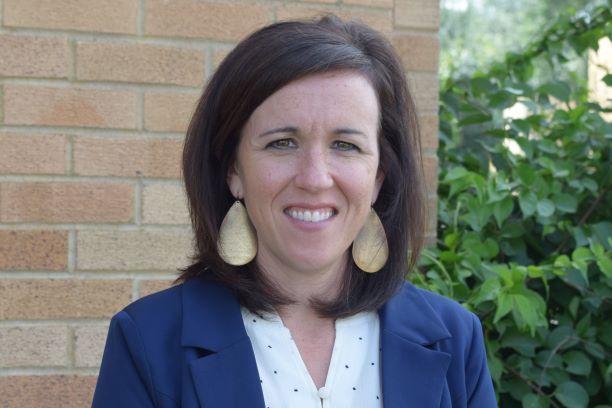|
Invite from the Chair:
"Briar Cliff University's Doctor of Occupational Therapy Program was designed for you! I invite you to discover our unique, occupational therapy program created to help you grow personally and professionally through real-life experiences. The inclusive, family-like culture values learners as experts in their own experiences and encourages them to contribute to the shared, interprofessional community of learning. Using a Franciscan lens, we learn how relationships and occupation can promote health and wellness in the communities we serve. We would love to have you join us and allow us to become a part of your story as you achieve the milestones towards a career in meaningful living."
-Cortni Krusemark, OTD, OTR/L, Assistant Professor and Founding Program Director

Cortni Krusemark, OTD, OTR/L
Program Director, Assistant Professor
Education and Training
- American Occupational Therapy Association, Credentialed Leader in Academia
- Clinical Doctorate, Occupational Therapy, Creighton University, Omaha, NE
- BA, Health Science, Wayne State College, Wayne, NE
Scholarship
- Krusemark, C. (2021) Narrative is Destiny. Abstract accepted as a platform presentation at the Iowa Occupational Therapy Association Fall Conference for October 30, 2021, Des Moines, Iowa.
- Krusemark, C. (2021) Visual Skills and Their Impact on Learning and Mental Health. Abstract accepted as a platform presentation at the Northwest Area Education Agency Conference for June 2021, Sioux City, Iowa.
- Beaulieu, T, Burris, E, Grieve, S, Krusemark, C. (2020). Chronic Pain Program. Abstract presented as a poster presentation at the Pro Bono Network Conference, virtual conference.
- Krusemark, C, Wienk, B, and Cross, P. (2020). The Effectiveness of a Distance-Based Interprofessional Educational Experience. Abstract presented as a poster presentation at the American Occupational Therapy Association Education Summit Conference, virtual conference.
- Krusemark, C., Wienk, B., Strong, E., Burns, S. J., Hauer, P., Schweinle, W., Cross, P. (2020). Inter- and intra-rater reliability of a comprehensive practical evaluation tool. Abstract presented as a poster presentation at the American Physical Therapy Association Educational Leadership Conference, virtual conference.
- Krusemark, C., and Grieve, S. (2022). Interdisciplinary reasoning. [Manuscript submitted for publication]. In Editor B. A. Schell and J. W. Schell (Ed.), Clinical and professional reasoning in occupational therapy (3rd Edition). [Unpublished-in draft]
- Vogel, E., Krusemark, C., Wienk, B., Burns, S., and Hauer, P. (2023, February 23). Assessing quality of doctor of physical therapy education in hybrid learning environment. [Poster presentation]. American Physical Therapy Association Combined Sections Meeting, San Diego, CA.
- Krusemark, C., Burns, S., and Cross, P. (2022, November 11). Mapping student success in a rehabilitation management course through the implementation of universal design for learning pedagogies. [Platform presentation]. American Occupational Therapy Education Summit Conference, Orlando, FL.
- Krusemark, C. (2021, October 30) Narrative is destiny. [Platform presentation]. Iowa Occupational Therapy Association Fall Conference, Des Moines, IA.
- Krusemark, C. (2021, June 21) Visual Skills and Their Impact on Learning and Mental Health. [Platform presentation]. Northwest Area Education Agency Conference, Sioux City, IA.
- Beaulieu, T., Burris, E., Breitbarth, J., and Krusemark, C. (2021, April). Analyzing prospective relationship between sensory modulation disorder and individuals with chronic pain. [Platform presentation]. Briar Cliff University Excellence Event, Sioux City, Iowa.
- Krusemark, C., Wienk, B., and Cross, P. (2020, October). The effectiveness of a distance-based interprofessional educational experience. [Poster presentation]. American Occupational Therapy Association Education Summit Conference, virtual.
- Krusemark, C., Wienk, B., Strong, E., Burns, S. J., Hauer, P., Schweinle, W., and Cross, P. (2020, October). Inter- and intra-rater reliability of a comprehensive practical evaluation tool. [Poster presentation]. American Physical Therapy Association Educational Leadership Conference, virtual.
Professional Membership
- American Occupational Therapy Association
- Iowa Occupational Therapy Association
- Nebraska Occupational Therapy
Community Leadership
- Siouxland Center for Active Generations, Advisory Board Member
- Briar Cliff University, Doctor of Physical Therapy, Advisory Board Member
- The Community Initiative for Native American Families
- Dixon County 4-H Council, Vice President, and Board Member
|